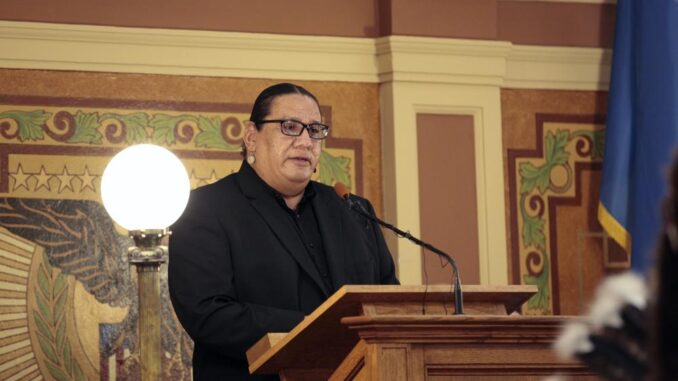
PIERRE, S.D. (AP) — The chairman of the Sisseton Wahpeton Oyate offered South Dakota’s Legislature a history lesson on Thursday during the annual State of the Tribes address, as he emphasized tribal sovereignty and government-to-government relations.
Chairman Delbert Hopkins Jr. entered the House chamber to a beating drum, Dakota songs and with an honor guard of tribal veterans. After leading the chamber in a moment of silence for the people who have died from COVID-19, he reminded lawmakers that treaties between the U.S. government and tribal nations have always been a part of the country’s history, starting with George Washington and the Constitution.
“In the state of South Dakota Admissions Act, the people of South Dakota promised that they would never lay claim to Indian lands as a condition of becoming a state,” Hopkins told the Legislature.
State and tribal governments have long had an uneasy relationship in South Dakota, and the annual State of the Tribes address, which is delivered by one of the nine tribal leaders in the state, is meant to foster cooperation. Hopkins named several areas where the state and tribes could work together better, including education, economic development and law enforcement.
But he also made sure to remind lawmakers that they owed even the state’s name to the tribes.
“Having adopted Dakota as the state’s name, public schools should teach about our history and culture of our Dakota Oyate and our Oceti Sakowin Seven Council Fires,” Hopkins said, referring to the tribes that are based in the state.
“That’s not critical race, that’s history of humanity,” he added, taking a jab at Republican Gov. Kristi Noem, who has prioritized banning so-called “Critical Race Theory” from public school classrooms this year.
Noem has acknowledged that Native American history is an essential part of the state’s history that should be taught. But last year, the state government faced protests by some Native American educators after the Department of Education removed more than a dozen references to Oceti Sakowin culture and history from a social studies standards proposal. Under pressure from Indigenous groups as well as fellow conservatives, Noem relaunched the standards review process.
Peri Pourier, a Democratic representative who is a member of the Oglala Lakota tribe, slammed the governor for not attending the event.
“Showing up to South Dakota’s own State of the Tribe’s Address would have been an essential part of repairing tribal relations for Governor Noem,” she said in a statement.
Hopkins drew a direct line from the abuses of Indian boarding schools that removed children from their families and stamped out Native languages to the problems plaguing reservations today, including high unemployment, aging school buildings and drug addiction.
“For decades, the poorest counties in America have always been our Sioux Reservations,” Hopkins said, as he advocated for economic development such as tourism.
Hopkins ended with a renewed call for cooperation, saying that the state and tribes could “accomplish great things with mutual respect and understanding.”
